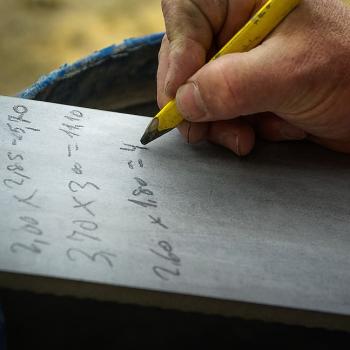Today’s post comes from guest writer, Matt Rhodes. I enthusiastically endorsed his new book, which came out today! (If you care about missions methods, this book is for you.) He has lived in North Africa since 2011. He and his wife, Kim, serve as part of a church-planting team to a previously unengaged people group.
“Thud! Thud! Thud!” boomed the drum. It was 2 am.
 My wife and I live in a small North African town without electricity, so the only way to get an urgent message out at night is to walk down the dirt road through the middle of town and wake everyone up.
My wife and I live in a small North African town without electricity, so the only way to get an urgent message out at night is to walk down the dirt road through the middle of town and wake everyone up.
The message being broadcast was this: A baby had been born nearby, only to die a few hours later. Sadly, that’s not unusual. What was unusual was that before he died, he spoke. He said, “The cure for coronavirus is bitter tea, boiled with onions.” So, in our town—and the enormous refugee camps outside—80,000 people rose at 2 am, boiled copious amounts of tea with onions and no sugar, then drank it. They even gave it to infants—too young to drink anything but milk—until the infants vomited.
Surely, this started as a prank. Drinking tea without sugar here is like drinking unsweetened Coca-Cola in the West. The added stipulation that it must be boiled with onions seems to suggest a prankish spitefulness.
But people are afraid and want hope. And there are other stories now: a root in Cameroon can cure the coronavirus. A tree in Madagascar can cure it. I warn people against cures like these because people who believe such fictions are less likely later to follow genuine medical advice that actually might prevent disease. I don’t need to worry about that. I drank bitter tea with onions.
Islam Makes You Immune?
Recently, I heard a new story: Muslims are immune to coronavirus. According to this now-popular tale, the coronavirus epidemic in China stopped soon after millions of Chinese converted to Islam.
I heard this story from a friend who has no access to fact-checking websites, so he thought it was true. It was the sort of thing that ought to be true, that he felt bad doubting. And I realized with sad recognition that they’re just like us. We do this too.
Let me explain.
Not long ago, a missionary colleague near where I work claimed to have planted a church. To be sure, he had only met one person in this church. He gave this young man a Bible and had briefly spoken with him about Scripture in Arabic (not the young man’s mother tongue). The young man, he reported, had then led several friends to Christ, and the church that had sprung into being was growing rapidly.
So, we have movement stories too. They are the sort of stories that ought to be true, that you feel bad doubting. They are easy miracle cures: no need for years of language study, for slow seasons of discipleship, or for painstaking translation of the Bible. The part of us that wants to believe these stories is hopeful, optimistic, and commendable. We see people’s need and want a cure to come quickly. But that doesn’t mean drinking tea-and-onion-stew will help.
Why? Because in ministry, as in medicine, God still works through human agency. And to the extent God has given us tools for fighting coronavirus, He has largely answered our prayers through the patient work of scientists, as He has done with other diseases.
God’s Work in Missions
Might the same be true in missions?
Jesus discipled by forming human relationships and teaching in human languages. “As the Father has sent me, so I send you,” he said. God works through our frail humanity—as He worked through Christ’s—to spread the knowledge of Him.
The all-too-human tasks of studying scripture, learning languages and cultures, answering people clearly—these tasks are essential. Missionary statesmen of the past—William Carey, John Paton, Hudson Taylor, Jim Elliot—knew this all too well. It is reflected in their years of preparation and their dogged pursuit of excellence in their work.
Sadly, these human tasks—scripture study, language learning, careful teaching—are largely being left behind today in our search for rapid, miracle cures. Focus too much on the human task of missions, and you’ll hear it suggested that you need to get out of the way, to stop crowding out the Spirit.
Indeed, without the Spirit’s power, we are helpless. But the Spirit primarily works through our humanity, not apart from it. Our feeble human efforts don’t crowd out His movement. They offer Him a space to move in. And though He’s powerful enough to move at breakneck speeds, He’s patient enough to work with people.
People need so much patience. I did.
Debunking Mission Miracle Cures
Further examination revealed that the church my colleague thought he had planted was not, in fact, a church. It is no longer meeting, if it ever did, and I’m sad to report this. But today, we need to debunk false cures in order to point toward real ones. In its urgent desire to respond as quickly as possible, the midnight drumbeat has heralded ineffective solutions.
And in some places, the situation has become dangerous. I’ve seen new missions methods spread, promoting the planting of churches at inhuman speeds, until, in many missions organizations, few other trainings are left. I’ve seen promising couples cut from teams in more than one missions organization because they wanted to attain high levels of proficiency in the language and culture before beginning to minister to profound problems at the heart of people’s humanity.
I’ve heard the stories: churches multiplying every six months as new believers (or even unbelievers!) disciple each other so that movements of millions spring up in a few years. Can God do this? Of course He can. But as often as I scratch below the surface, these stories turn out mostly false.
Blog posts only allow for an abridged treatment of these problems, but I believe we can go past mere criticism: we gain little by simply refusing to drink bitter tea. Instead, I hope to suggest that the solution, described in detail in my upcoming book No Shortcut to Success, lies in returning to the arduous, human processes of ministry that missionaries of the past knew so well.












